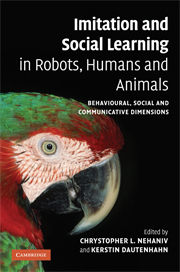 Imitation and Social Learning in Robots, Humans and Animals
Imitation and Social Learning in Robots, Humans and Animals Published online by Cambridge University Press: 10 December 2009
Introduction
In neuroscience, if we wish to identify the brain areas that serve particular functions, a common approach is to study behaviour when part of the brain has been rendered inoperative as a result of injury or illness. By identifying the functional loss of a particular brain area, we can learn something about the role of that brain area in normal conditions. One problem with this approach is that it treats the brain as if its functional specialization was static rather than a dynamic and developing process. A brain area may feasibly serve a role in the development of a function, but lose that later in life. Therefore, we need to understand the processes that are necessary for the development of function and ask about the brain mechanisms that serve them. Then, if we can examine a condition in which those processes are impaired, and we can find the brain bases for that impairment, this might be a better way to appreciate the role of that brain area in serving the function in question. The way that we understand other people's thoughts may be a good case in point. It may be profitable to study the processes that contribute to the development of social understanding, if we are to understand its neural substrate in adulthood. Imitation seems likely to be one important developmental process, necessary for the acquisition of culture, language, knowledge and social cognitive abilities (Whiten et al., 2003; Meltzoff and Moore, 1999).
To save this book to your Kindle, first ensure [email protected] is added to your Approved Personal Document E-mail List under your Personal Document Settings on the Manage Your Content and Devices page of your Amazon account. Then enter the ‘name’ part of your Kindle email address below. Find out more about saving to your Kindle.
Note you can select to save to either the @free.kindle.com or @kindle.com variations. ‘@free.kindle.com’ emails are free but can only be saved to your device when it is connected to wi-fi. ‘@kindle.com’ emails can be delivered even when you are not connected to wi-fi, but note that service fees apply.
Find out more about the Kindle Personal Document Service.
To save content items to your account, please confirm that you agree to abide by our usage policies. If this is the first time you use this feature, you will be asked to authorise Cambridge Core to connect with your account. Find out more about saving content to Dropbox.
To save content items to your account, please confirm that you agree to abide by our usage policies. If this is the first time you use this feature, you will be asked to authorise Cambridge Core to connect with your account. Find out more about saving content to Google Drive.